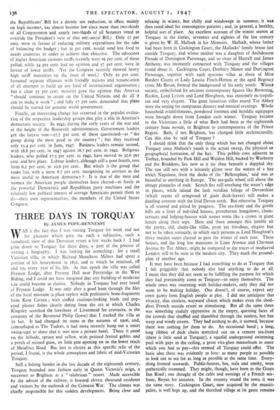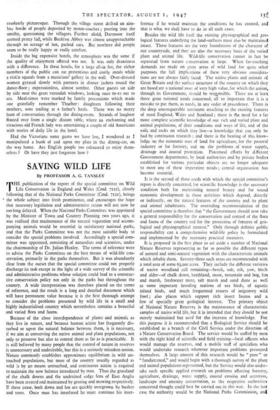THREE DAYS IN TORQUAY
By JAMES POPE-HENNESSY
WAS it the fact that I was visiting Torquay for work and not for pleasure which gave me such a subjective, such a jaundiced, view of this Devonian resort a few weeks back ? I had gone down to Torquay for three days, a part of the process of writing a biography. I was looking for something: for a small Victorian villa, in which Richard Monckton Milnes had spent a portion of his honeymoon in 1851, and to which he returned, off and on, every year of his life. At that epoch the villa was called Fryston Lodge, after Fryston Hall near Ferryridge in the West Riding, and I could not have imagined that any building of moderate size could become so elusive. Nobody in Torquay had ever heard of Fryston Lodge. It was only after a good hunt through the files of the local museum (a place replete with prehistoric bone-fragments from Kent Cavern ; with stuffed cautious-looking birds and pop- eyed plaster fishes clearly dating from the era at which Charles Kingsley searched the foreshore of Livermead for crustacea, in the company of the Reverend Philip Gosse) that I tracked the villa to its lair. It had changed its name in the autumn of 1906, and, camouflaged as The Tudors, it had more recently hung out a smart swing-sign to show that it was now a private hotel. There it stood on the hillside, spruce and yellow, with pointed fretted gables and a porch of stained glass, its little gate opening on to the lower reach of Meadfoot Road. But just as elusive as this specific relic of the period, I found, is the whole atmosphere and fabric of mid-Victorian Torquay.
Still a fishing hamlet in the last decade of the eighteenth century, Torquay bounded into fashion early in Queen Victoria's reign, a successor to Brighton as a " salubrious " resort. Made accessible by the advent of the railway, it boasted eleven thousand residents and visitors by the outbreak of the Crimean War. The climate was chiefly responsible for this sudden development. Being close and
relaxing in winter, but chilly and windswept in summer,-.it was then rated ideal for consumptive patients ; and, in general, a healthy, helpful sort of place. Art excellent account of the winter season at Torquay in the sixties, seventies and eighties of the last century is given by W. H. Mallock in his Memoirs. Mallock, whose father had been born in Cockington Court, the Mallocles' family house just outside Torquay, and whose mother was a daughter of Archdeacon Froude of Darlington Parsonage, and so sister of Hurrell and James Anthony, was intimately connected with Torquay and the villages round about it. Cockington Court, Denbury Manor and Dart:ngton Parsonage, together with such spacious villas as those of Miss Burdett Coutts or Lady Louisa Finch-Hatton or the aged Regency cynic Mr Bevan, formed the background of his early youth. Winter society, embellished by em:nent contemporary figures like Browning, Ruskin, Lord Lytton and Lord Houghton, was extremely m.-tropoli- tan and very elegant. The great luxurious villas round Tor Abbey were the setting for sumptuous dinners and musical evenings. Whole household establishments, powdered footmen and heraldic equipages were brought down from London each winter. Torquay became to the Victorians a little of what Bath had been to the eighteenth century beau monde, or Brighton to contemporaries of the Prince Regent. Bath, if not Brighton, has changed little architecturally. Can this also be said of Torquay ?
I should think that the only thing which has not changed about Torquay since Mallock's youth is the actual sweep, the physical or geographical formation, of the bay. This pebbly cove adjacent to Torbay, bounded by Park Hill and Waldon Hill, backed by Warberry and the Braddons, lies now as it iay then beneath a dappled sky. The sun still sets with a leisurely glitter over the waters of a bay which Napoleon, from the decks of the Bellerophon,' said was as beautiful as anything in Europe. The sea-gulls wheel still above the abrupt pinnacles of rock. Scotch firs still overhang the water's edge in places, while inland the lush veridian foliage of Devonshire (which seems all composed of giant dock-leaves) still makes a dazzling contrast with the livid Devon earth. But otherwise Torquay is all scarred and pitted by progress. The sea-front and the gentle hills are a litter of red-tiled houses, protuberant bungalows, chain- terraces and lodging-houses with names worn like a crown in•giant letters along their tops. Here and there amongst this jumble sit the pretty, old, chalet-like villas, prim yet frivolous, elegant but not to be taken seriously, in which such persons as Lord Houghton's three maiden aunts elected to pass the winter of each year. These houses, and the long low mansions in Lime Avenue and Chestnut Avenue by Tor Abbey, might be compared to the traces of mediaeval London still to be seen in the modern city. They mark the ground- plan of another age.
It may have been because I had something to do at Torquay that I felt priggishly that nobody else had anything to do at all. I mean that they did not seem to be fulfilling the purpose for which they had presumably come to Torquay—to enjoy themselves. The whole town was swarming with holiday-makers, only they did not seem to be making holiday. One doesn't, of course, expect any overt gaiety from English people at play. I did not anticipate that vivacity, that careless, wayward charm which makes even the shod- diest French seaside resort so stimulating. But all the same there was something unduly oppressive in the empty, questing faces of the crowds that shuffled and shambled through the sunless, hot but steep and windy streets. They had nothing to do, it seemed, because there was nothing for them to do. An occasional band ; a long, long ribbon of deck chairs stretched out on a cement sea-front (there is little sand at Torquay), a squalid underground swimming pool with gaps in the ceiling, a great vita-glass mausoleum to enter which you had to pay—this seemed all Torquay could offer. The basic idea there was evidently to force as many people as possible to look out to sea for as long as possible at the same time. Every- thing fronted seawards. Public-houses, hot, stale and smoky, were pathetically crammed. They might, though, have been in the Grays Inn Rbad ; one thought of the cafés and awnings of a French sea- front, Royan for instance. In the country round the town it was the same story. Cockington Court, now acquired by the munici- pality, is well kept up, and the thatched village at its gates remains resolutely picturesque. Through the village street drifted an aim- less horde of people deposited by motor-coaches ; peering into the smithy, questioning the villagers. Further afield, Dartmoor itself seemed pretty full, while Buckfast Abbey was almost unapproachable through an acreage of hot, parked cars. But nowhere did people seem to be really happy or really carefree.
Inside the big expensive hotels, the atmosphere was the same if the quality of enjoyment offered was not. It was. only dreariness with a difference. In these hotels, for a large all-in fee, the richer members of the public can eat pretentious and costly meals while a violin squeals from a musicians' gallery in the wall. Over-dressed women gyrated slowly with partners in dinner jackets round the dance-floor ; expressionless, almost sombre. Other guests sat side by side near the great verandah windows, looking once more out to sea. Meal-times were marked by family processions which made one gratefully remember Thurber : daughters following their mothers, sons trailing at a father's heels. There was no merry hum of conversation through the dining-room. Strands of laughter floated over from a single distant table, where an enchanting and vivacious old French lady was entertaining a couple of old Americans with stories of daily life in the hotel.
Had the Victorians some gusto we have lost, I wondered as I manipulated a hunk of cod upon my plate in the dining-car, on the way home. Are English people too exhausted to enjoy them- selves ? Or have they just forgotten how ?



































 Previous page
Previous page